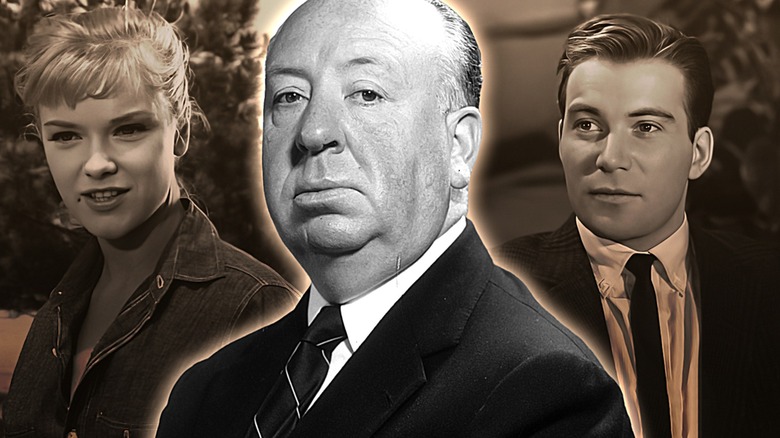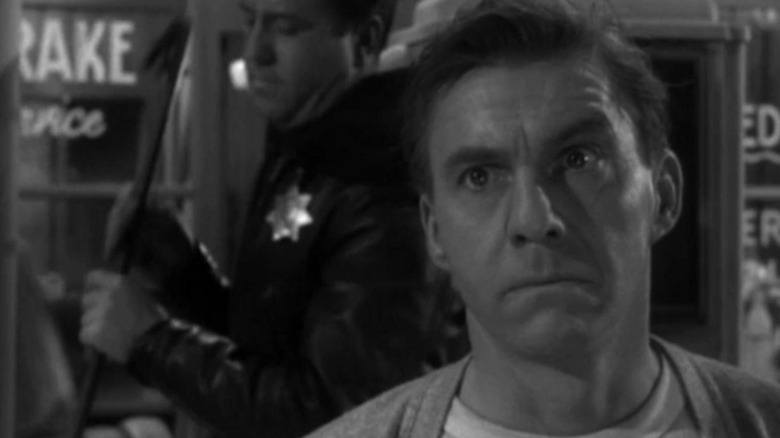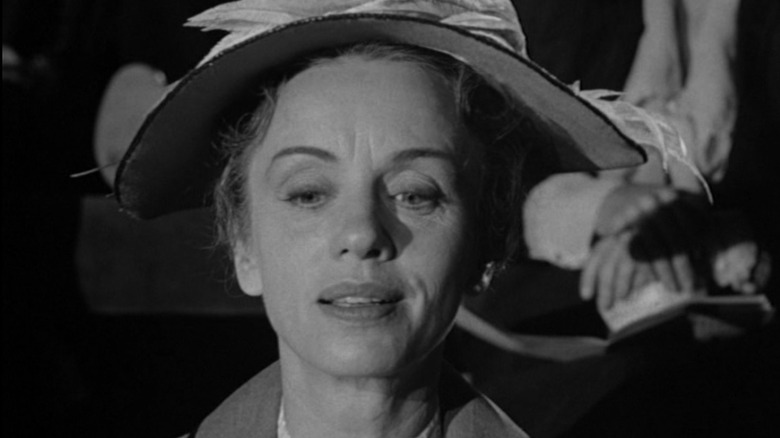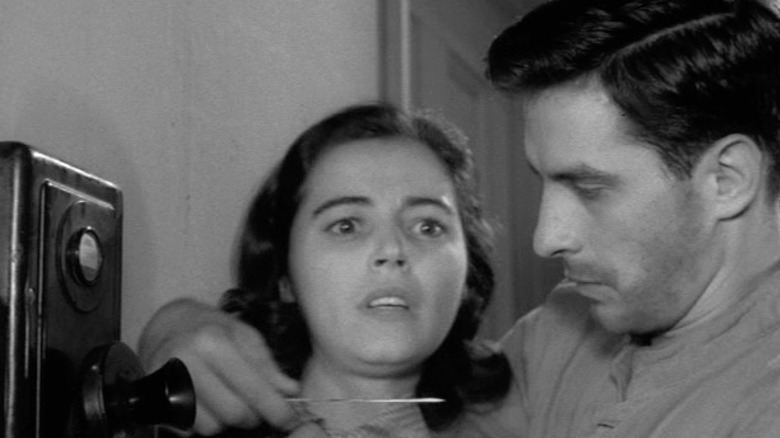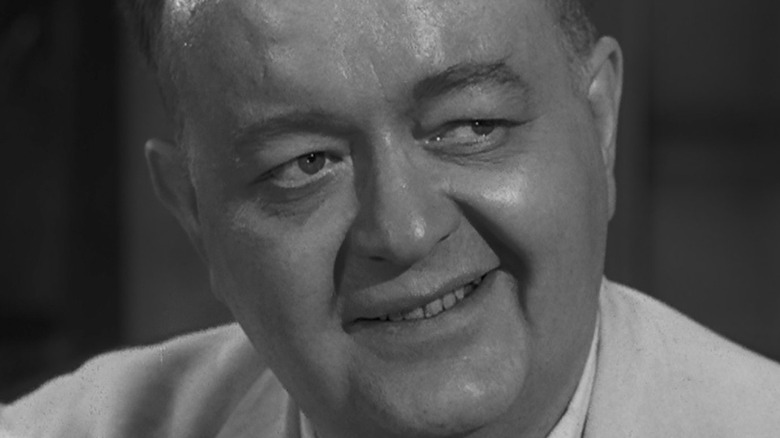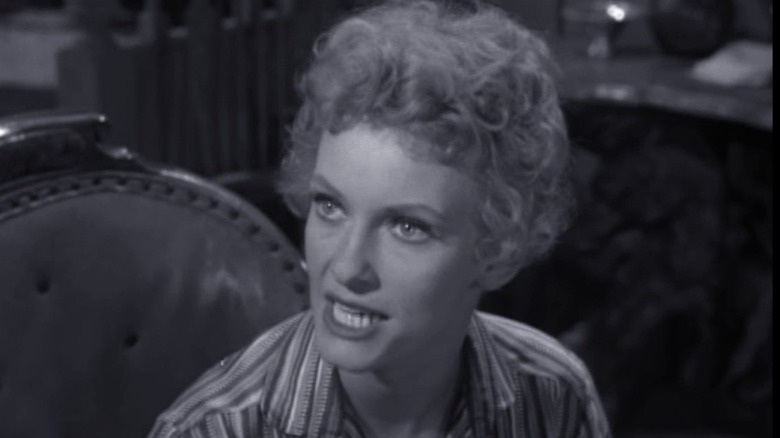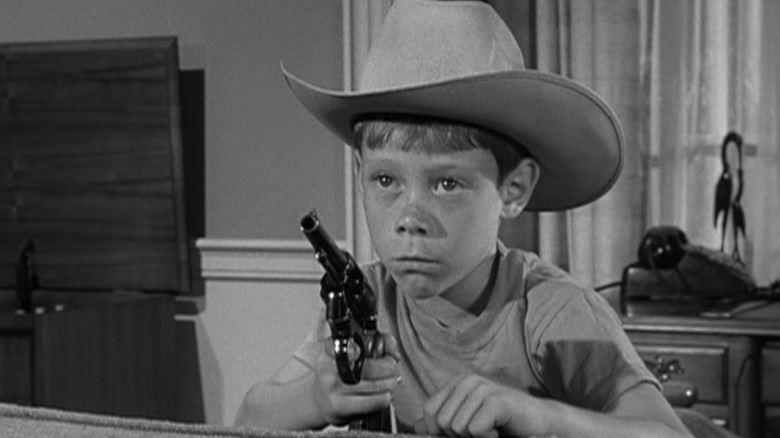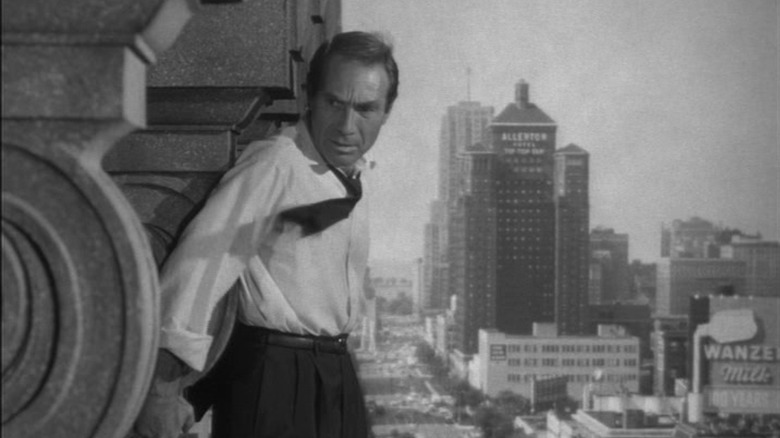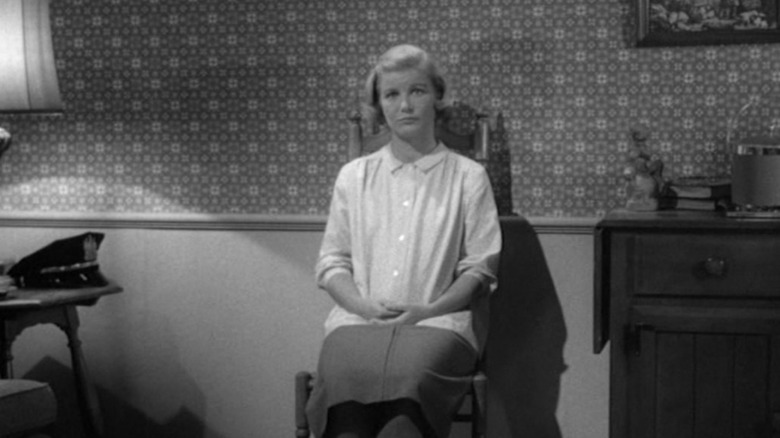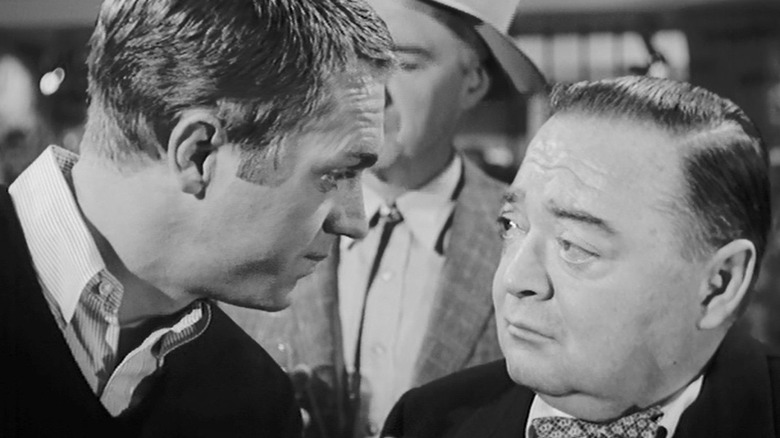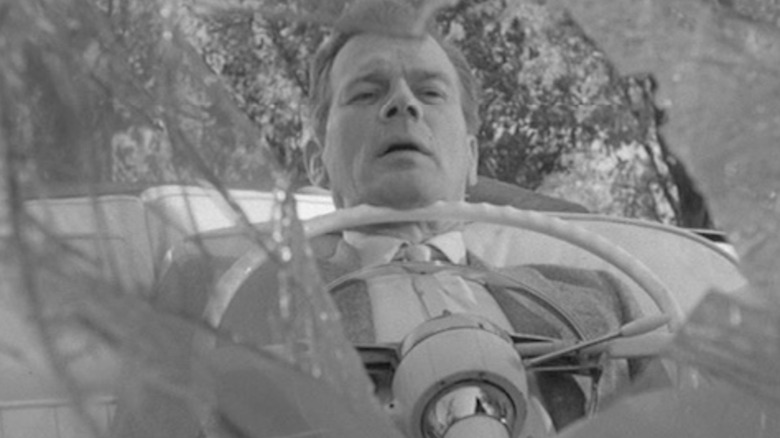The 10 Best Episodes Of Alfred Hitchcock Presents, Ranked
There are few better ways to spend a half hour than with an episode of "Alfred Hitchcock Presents." Funny, scary, mysterious, cynical, sinister, and sometimes even sexy, the anthology series created and presented (and sometimes directed) by the Master of Suspense is the complete package. The show was indelible when it first aired in the 1950s, and it remains so today, with storylines that feel surprisingly modern, twists designed to leave you gasping, and an unrelenting fixation on the darkest corners of the human heart.
To choose the best episodes of "Alfred Hitchcock Presents" is a bit of a fool's errand, the kind of task Hitch himself would probably scoff at in one of his campy, sarcastic episode introductions. This is, after all, a show that multiple generations watched solely via linear TV, catching stray episodes in syndication rather than binge-watching it in its entirety. It's also a series with ill-defined borders; seven seasons of "Alfred Hitchcock Presents" aired between 1955 and 1962, then the show changed its length and title, becoming "The Alfred Hitchcock Hour" for its last three years.
This list includes only episodes featured under the original title, and though the top-rated episodes of the series (per IMDb) were referenced as a series entry point, the ranking itself is ultimately the product of one writer's depraved imagination. Rest assured: If I've missed any of your favorite episodes, I will no doubt be arrested and charged by the proper authorities after the end credits roll.
10. One More Mile To Go
One of the most stylishly built episodes of the series starts incredibly strong, but arguably runs out of gas before it draws to a close. The season 2 outing "One More Mile To Go" stars David Wayne as a man named Sam Jacoby, who, like so many "Alfred Hitchcock Presents" protagonists before and after him, kills his wife early in the episode. Unlike other stories, though, the killing of Mrs. Jacoby (Louise Larabee) is presented via music and sound effects alone, and the first 10 minutes of the episode relay the dark aftermath of her killing without uttering a single word.
Hitchcock directed "One More Mile To Go," and while the transition from silence to sound here isn't quite as meaningful as in 1929's "Blackmail," it's one of several striking cinematic choices the filmmaker makes in its short runtime. The silence is broken by the voice of a nosy police officer (Steve Brodie), who harangues Sam about a broken taillight while he's on the way to dispose of his wife's corpse. The rest of the episode draws out a clever premise a bit too long to keep its tension, but the whole thing is held together by Wayne's quietly pained performance and Hitchcock's decision to let the actor's expressive face do most of the talking.
9. The Glass Eye
"The Glass Eye" is often cited as one of the scariest episodes of "Alfred Hitchcock Presents," for good reason. The season 3 premiere — also directed by Hitchcock — makes incredible use of shadows and light, blanketing its most mysterious character in velvety darkness before revealing his true nature with some truly shocking imagery. In terms of episodes of the show that inspired lifelong fears in any kids who caught it, this story of a lonely older woman (Jessica Tandy) who becomes an obsessive fan of a ventriloquist performer (Tom Conway) is pretty much unparalleled nightmare fuel. A frame narrative featuring a young, uncharacteristically understated William Shatner makes the whole thing even better.
Despite its scare factor, though, "The Glass Eye" doesn't hold up particularly well to modern scrutiny. Without giving away its major twist, it's worth noting that the horror of the story's conclusion relies on audiences to hold ableist, ageist, and sexist ideas about its two main characters, and its twist doesn't make much sense if you think about it for more than a moment. While it perhaps vaguely gestures towards the idea that it's society itself that keeps these ideas alive, the episode ultimately views physical and social difference as grotesque in a way it doesn't entirely reckon with. "The Glass Eye" has its problems, but it also gives us Hitch in rare full-blown horror mode, which is never something to take for granted.
8. You Got To Have Luck
A season 1 episode about an escaped convict pushing a housewife to help him out works well, but perhaps not for the reasons the show intends. There's a rugged carnality to John Cassavettes' murderous Sam Cobbett, who manages to come across as a captivating antihero even after he kills a dog before his first on-screen appearance. There's more than one "Alfred Hitchcock Presents" episode about a woman being held hostage by a runaway prisoner (see also: "The Woman Who Wanted To Live"), and in Hitch's signature sicko style, these projects often blur the lines of the relationship, making it unclear whether the convict is really seeking an ally, prisoner, mother figure, or lover. This episode is no exception; it's lurid in a distinctly Hitchcockian way, despite the fact that Robert Stevens was in the director's chair.
"You Got To Have Luck" has a particular bite to it thanks in part to a winning performance from Italian actress Maris Pavan, whose young wife character Mary definitely does not want to help Cobbett. The pair face off in a number of intense confrontations, and the episode, which largely unfolds in real time, is a tense and charged thriller. The story's final twist is less a stroke of genius and more the type of explanation you'd expect from a parlor game riddle, but "You Got To Have Luck" succeeds on the merits of its dynamic co-stars and complete use of its runtime.
7. The Right Kind of House
Frequent "Alfred Hitchcock Presents" guest star Robert Emhardt returns for the fifth of six total appearances in "The Right Kind of House," a well-executed mystery buried in the show's third season. This time around, Emhardt plays Mr. Waterbury, an out-of-towner who hopes to buy a run-down old house belonging to a local named Sadie (Jeanette Nolan). Sadie's had the house on the market for years at an inflated price, and when a real estate agent sends Waterbury over to haggle with her, she sits him down to explain exactly why the old haunt means so much to her.
"The Right Kind of House" is "Alfred Hitchcock Presents" at its most seamless. Its central twists are not unpredictable (especially given the episode's enjoyably ambling pace), but they're executed so gracefully that the end result is satisfying whether you guessed what was coming or not. Emhardt is a slippery cipher as the stranger who knocks on Sadie's door, while Nolan imbues her character with wisdom and a deep well of emotion. The parable plays with the ideas of grief and justice, and nails small town life in a way some other episodes of the show — which seems both obsessed with and deeply afraid of the world outside city limits — don't. Surprisingly, the episode's smooth bait-and-switch and memorable one-off characters (not to mention its specific twist) feel like an antecedent to FX's "Justified," with Robert C. Dennis and Henry Slesar penning the Elmore Leonard-esque script.
6. The Last Dark Step
"The Last Dark Step" isn't always heralded as one of the best episodes of "Alfred Hitchcock Presents," but it should be thanks to its razor-sharp script and an equally cutting key performance. The season 4 episode takes an unusually common premise for the show — one man is trying to date two women, and the less innocent of the two holds some sort of power over him — and turns it on its head by making the villainous woman, novelist Leslie (Faye Spain), a diva worth rooting for.
When he tells her he's marrying someone else, Leslie is unnecessarily savage to her beau (Robert Horton), and her vitriol-filled monologues in their first scene together would make a great drag performance in the vein of Toni Collette's "mother" speech from "Hereditary." Seriously, Leslie is breathing fire here, and Spain sells it so well that it's tough not to be on her side, even when Horton's Brad initially seems like a decent dude. The third corner of the love triangle comes back into the story later, as a particularly nasty crime is met with a vindicating third-act twist. "The Last Dark Step" engages several tropes and story beats that Hitchcock (who didn't actually write or direct this episode) would return to again and again, but this poison-dipped love-hate story still feels one of a kind.
5. Bang! You're Dead
Just two weeks before he held a whole town under his psychic command in "The Twilight Zone" episode "It's A Good Life," child actor Bill Mumy starred in "Bang! You're Dead," a season 7 "Alfred Hitchcock Presents" episode which also sees the tyke scaring the hell out of all the adults around him. In this case, it's because Mumy's character, wannabe kid cowboy Jackie, gets his hands on a real gun that he and everyone around him thinks is a toy. Since he's a white kid and it's the sixties, Jackie wanders freely around his neighborhood, aiming the weapon at unsuspecting strangers while the audience at home shrieks and tries not to cover their eyes.
Hitchcock returns to direct here, and does a fantastic job continually ratcheting up suspense for an all-too-real story about the horrors of potential gun violence. In a rare show of seemingly genuine moral commitment, the director even ends the episode with an overt call for firearm safety, putting aside his typical sardonic wit for a few vital seconds. Far from a traditional Very Special Episode, "Bang! You're Dead" inspires real, almost unbearable fear by forcing audiences to face an unthinkable yet all-too-common reality for 25 minutes straight.
The episode also has some thinly veiled messages about race and colonialism, as examined further by author Jack Seabrook. Jackie's uncle (Stephen Dunne), is fresh off a plane from Africa, where he witnessed colonialist violence and ended up in possession of some tribal masks that definitely weren't meant to be used as toys, either. Instead of picking up the mask gifted to him, Jackie takes the gun, setting off the episode's excruciating chain of events. The mask comes back later, in a scene that's layered with subtext and laced with tension.
4. Man With A Problem
A deceptively straightforward chapter of Hitchcock's anthology, "Man With A Problem" tells a deliberately paced story with a genuine shocker of a last-minute twist. The Robert Stevens-directed episode begins with a man named Carl (Gary Merrill) at the end of his rope. He takes to the window ledge of a high office building, and while police officers try to talk him down and a morbid crowd jeers at him below, audiences are steadily clued in to the circumstances that brought him to this point.
"Man With A Problem" uses a non-linear format that makes its story especially engrossing, and for much of its runtime it seems more like a serious character drama than the type of pulpy, surprise-filled story "Alfred Hitchcock Presents" was known for by its fourth season. Yet the episode's convincing setup and strong emotional core turns out to be the foundation for a staggering turn of fate that reframes the whole story. "Alfred Hitchcock Presents" occasionally stoops to cheap endings, but this isn't one of them. Concluding beat aside, a strong performance from Merrill and an acutely cynical worldview that feels especially taboo-busting in a '50s TV landscape make "Man With A Problem" a series standout.
3. Lamb To The Slaughter
TV anthology shows have their shortcomings, but they also have something serialized shows don't: the punchline episode. While your favorite drama or comedy isn't typically able to build an entire episode around a wickedly funny final shot or line of dialogue, short story-like anthologies can. As a result, we're gifted great, wry episodes of television like "The Twilight Zone" favorite "To Serve Man" and, in the case of Hitchcock's show, the Roald Dahl-penned endeavor "Lamb To The Slaughter." The series' creator directed this season 3 episode, which came two years before "Psycho" and openly workshops some of the story setups and even exact shots that would make that film a classic.
In place of Norman Bates, here we have Mary Maloney (Barbara Bel Geddes), a quiet, pregnant housewife who beats her husband to death with a frozen leg of lamb one night after he casually tells her he's going to leave her. Released just a month before "Vertigo" put her on screen in vivid color, "Lamb To The Slaughter" proves Geddes a Hitchcock blonde of epic proportions; the episode's drama hinges on investigators' sexist dismissal of the seemingly unassuming new widow, and the actress plays that part perfectly. Mary's not apologetic about her husband's death, and indeed seems relieved. A transgressive take on marital mistreatment is capped off with a silly-yet-ingenious tying of loose ends, and all of it looks gorgeous thanks to some of Hitchcock's best small-screen directorial work.
2. Man From The South
Other episodes on this list may take the cake as the scariest, deepest, or most stylish installments of "Alfred Hitchcock Presents," but none of them can beat "Man From The South" in terms of sheer oddity. A truly weird episode from its inciting incident to its final shot, the season 5 favorite also manages to keep an impressive sustained tension throughout. The episode begins normally enough, with an unnamed Las Vegas gambler (an excellent Steve McQueen) chatting up a pretty woman from out of town (Neile Adams) at a hotel bar. There are any number of ways regular viewers of the series might have expected the show to go from there, but a bet involving a convertible car and a potentially lopped-off pinkie finger isn't one of them.
McQueen and Adams quickly charm, and their meet-cute is believable enough that when a third party enters the picture in the form of imposing oddball Carlos (go-to freaky dude character actor Peter Lorre), things immediately start to feel sinister. Carlos makes a peculiar offer, telling the man he'll give him a car if his trusty corner store lighter starts ten times in a row. The small print involves a possible lost digit, and though it's a hellish sort of proposition, we know the gambler's going to gamble. "Man From The South" is most remembered for its horrifying and somewhat silly ending (it's another episode co-written by children's author Dahl), but there's plenty to love before that, too. An extended scene related to the bet is as entertaining as it is tough to watch, and the episode coils its tension tighter moment to moment until it nearly suffocates. Each of the main actors is also firing on all cylinders, and together they create a sort of TV alchemy: an absurd, darkly funny horror story we can't help but buy into.
1. Breakdown
"Alfred Hitchcock Presents" may feign levity by bookending its stories with jokes from its host, but more often than not, the substance of the show asks us to think about what we — and Hitchcock — are afraid of. The show provides a few popular answers (death, loneliness, betrayal, authority, financial instability, men) and a few not-so-common ones (strangers who want to chop off your finger, creepy puppeteers), but it rarely forces audiences to realize a potential fear in real time as powerfully as it does in "Breakdown." The episode comes early in the show's first-season run, and is only the second directed by Hitch himself (the first, "Revenge," is also worth a watch), but it's among the most groundbreaking and innovative in the entire series' run.
"Breakdown" tells the story of William Callew (Joseph Cotten, who starred in "Shadow of a Doubt" for Hitchcock a decade earlier), a seemingly uncaring film producer who we first see firing an employee who emotionally begs for his job over the phone. It's a common enough setup, but the episode soon takes a literal detour, one that results in William being paralyzed in the wake of a horrific auto accident. The rest of the episode follows the man's fight for his life, as he fears he'll be left for dead due to his inability to move. Unlike much of the series, "Breakdown" notably ends with a moment of real sincerity.
Where other episodes of the show use disability as a jump scare or a punchline, "Breakdown" digs into what it really means to be locked in one's body. Cotten narrates Callew's increasingly panicked thoughts in voiceover while the actor lies prone and vulnerable, his mouth contorted into an unspoken scream. It's a harrowing premise that taps into fears both visceral and existential, and it's told with expert precision and flair by a master storyteller making the most of a brand new medium.
